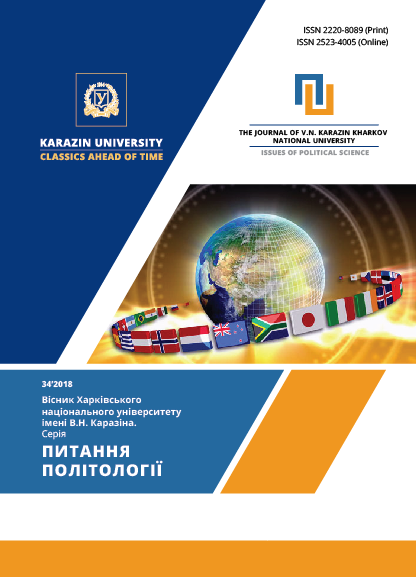POWER AND POLITICAL STABILITY DURING THE INFORMATION EPOCH'S TRANSFORMATIONS
Abstract
Today the world is experiencing an era of paradigm transformations. The information stage, which began in the mid-twentieth century, is changing industrial world. State of transition humanity has already passed in days of the beginning of a new era, in the Renaissance. Apparently, the acceleration of dynamics of social transformations in the 21st century will be even more obvious. What was previously required for thousand years, centuries, today is possible for several years. Societies that are lagging behind in certain parameters from the leaders of modern trends, have been able to quickly catch up on lost time. Instability, uncertainty as a state of modernity regarding different spheres of human existence, and in particular, politics are in many ways a logical consequence of the transition era. However, the more urgent is the development of question about stabilization factors, about responses to challenges both at global and regional, local, and even individual levels.
The specificity of transformations of power as a type of social interaction, as communication, which is associated with the production and control of cultural codes, axiological meanings that are important for human life and communities, is investigated. At the information stage, communicative quality of power is particular importance for finding out possible principles of stability for a sociopolitical space. The challenges of present stage are ambivalent: between autocratic and democratic management techniques. In the context of the development of practices of the first type of Internet, the world that they create can become a place of total control of a new type. The complexity of challenges faced by global community, argues in favor of need for open and informal interaction, cooperation, social mutualism. Individualization and return to man as a microcosm, which harmonizes with the macrocosm (according to G.S. Skovoroda) reflects the real components of synergy as basis of social engineering, adequate to the challenges of modernity.
Downloads
References
Авксентьєва, Т. Г. 2009. “Соціокультурні трансформації: становлення консенсусних засад інформаційного суспільстваˮ, в Соціокультурні трансформації у процесі становлення інформаційної цивілізації в Україні. Х.: ХНУРЕ: 52-67.
Poster, M. 1997. Cultural history and Postmodernity: Disciplinary readings and challenges. New York: Columbia University Press.
Winner, L. 1992. Democracy in a Technological Society. Kluwer Academic Publishers.
Мамфорд, Л. 2001. Миф машины. Техника и развитие человечества. М.: Центр гуманитарных технологий. URL: http://gtmarket.ru/laboratory/basis/3115 (дата звернення 10.11.2018).
Leadbeater, Сh. 2000. Living on Thin Air: The New Economy. London:Penguin Books Ltd.
Dizard, W.P. 1982. The Coming Information Age: An Overview of Thechnology, Economics, and Politics. New York: Longman.
Нейсбит, Дж. 2003. Мегатренды. М.: ООО Изд-во АСТ: ЗАО НПП Ермак.
Кастельс, М. 2004. Галактика Интернет: Размышления об Интернете, бизнесе и обществе; пер. с англ. А. Матвеева под. ред. В. Харитонова. Екатеринбург: У-Фактория при участии изд-ва Гуманитарного ун-та).
Author’s copyright and licensing.
License Terms: Authors retain copyright and also grant the Journal the right to publish original scientific articles that contain research results and are not under consideration for publication in other issues. All material is licensed under a Creative Commons Attribution License International CC-BY, which allows others to distribute their work with the copyright of this work and recognition of the first publication in this Journal.
If the article is taken for publishing in The Journal of V.N. Karazin Kharkiv National University. “Political Science Issues”, the author must sign a copyright transfer agreement. The agreement is sent by post (original document) or by e-mail (scanned copy of the document) to the Editorial Board of the Journal.
By this agreement the author certifies that the submitted material:
- does not violate the copyrights of other people or organizations;
- has not been previously published in other issues and has not been given for publishing to other issues.
The author gives the editorial board the rights to:
- publish the article in Ukrainian (English) and distribute its printed version;
- translate the article into English (for articles in Ukrainian) and distribute the printed version of the translation;
- distribute the electronic version of the article, as well as the electronic version of the English-language translation of the article (for articles in Ukrainian and Russian), through any electronic means (placing on the official journal web site, in electronic databases, repositories, etc.).
The author reserves the right without the consent of the editorial board and the founders to:
- Completely or partly use the materials of the article for educational purposes.
- Completely or partly use the materials of the article for writing own theses.
- Use the materials of the article to prepare abstracts, conference reports, and oral presentations.
- Post electronic copies of the article (including the final electronic version downloaded from the journal's official website) to:
- personal web-resources of all authors (web sites, web pages, blogs, etc.);
- web-resources of institutions where authors work (including electronic institutional repositories);
- non-profit, open-source web resources (such as arXiv.org).




